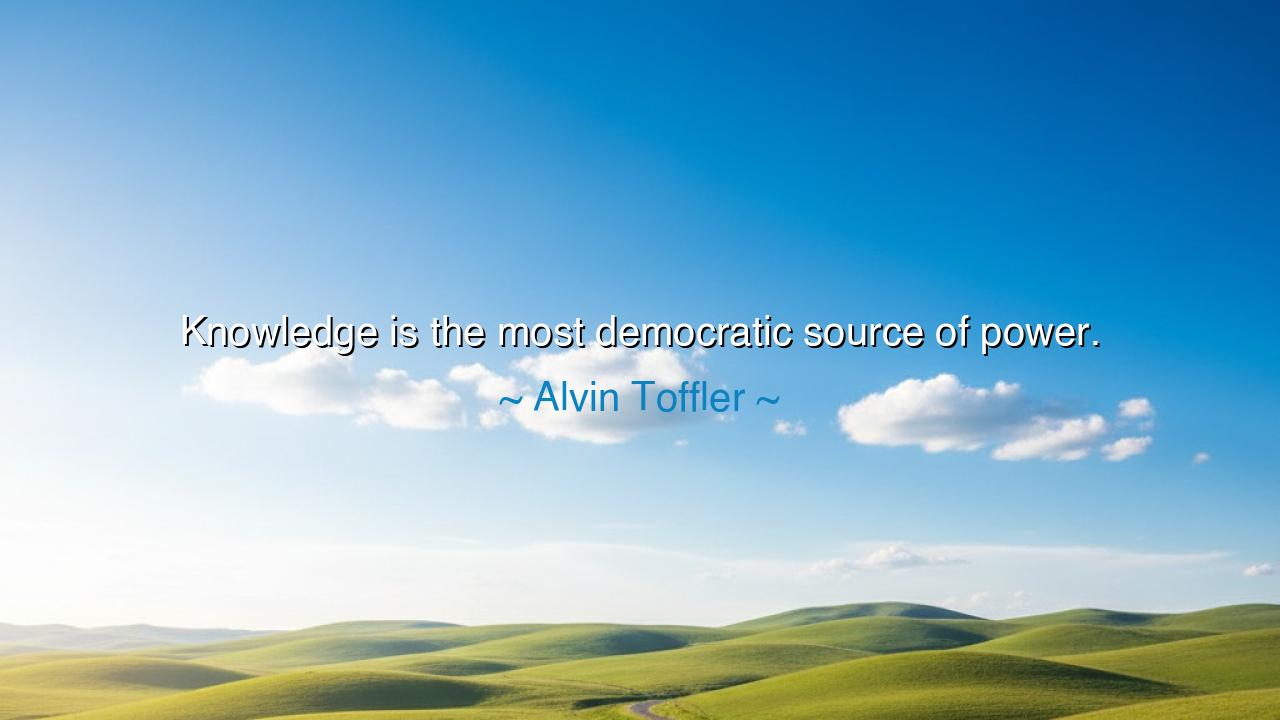
Knowledge is the most democratic source of power.






The sage Alvin Toffler once spoke, saying: “Knowledge is the most democratic source of power.” In this saying is contained a truth as deep as the ocean and as eternal as the mountains. For power has taken many forms throughout the ages: the might of armies, the wealth of gold, the command of kings. Yet all of these are bound by privilege, inheritance, or force. Only knowledge—unlike the sword, the crown, or the coin—can be reached by any soul who hungers for it. Toffler reminds us that power no longer belongs solely to the few who inherit titles or treasure, but to all who seek to understand, to learn, to know.
Consider the long ages past, when emperors built walls and priests guarded scrolls, and knowledge was hidden like a flame kept under a vessel. In those days, the masses bowed to those who possessed sacred writings or secret laws. But the fire could not be kept contained forever. With the coming of the printing press, knowledge spread like a river breaking its dam, and with it, men and women who once bent their backs in silence found voices of their own. The Reformation, the Enlightenment, the rise of democratic ideals—all these were born not of armies greater than their foes, but of knowledge shared among common people.
Take the tale of Frederick Douglass, born a slave in the United States. He was denied freedom, denied dignity, and even denied the right to learn letters. Yet he stole moments to study, teaching himself to read and write in secret. With this gift of knowledge, he broke chains more mighty than iron—the chains of ignorance. His words, written and spoken, stirred hearts, inspired abolitionists, and gave light to the oppressed. His power did not come from wealth or armies, but from the democratic force of knowledge that no master could forever withhold. In Douglass’s life, we see Toffler’s truth embodied: knowledge empowers the lowly as surely as it empowers the mighty.
Toffler lived in an age when the tides of information grew swifter than ever before. He foresaw that in the future, power would not belong to those who merely own land or factories, but to those who command knowledge—the scientists, the inventors, the teachers, the dreamers. In the realm of the digital, where data flows like wind across the earth, the smallest child with a screen may access wisdom once locked in royal libraries. This, truly, is democracy: when the gate to knowledge swings open for all, and each who enters may take up power for themselves.
But heed this warning, children of tomorrow: though knowledge is the most democratic source of power, it is not evenly grasped. Many turn away from it, distracted by the noise of empty voices. Others cling only to shallow fragments, mistaking them for wisdom. Toffler’s words are a call to seek knowledge deeply, not to skim its surface. For only when knowledge is pursued with discipline, with humility, and with purpose, does it rise into true power—the kind that builds civilizations rather than destroys them.
The lesson, then, is clear: do not wait for kings or leaders to grant you power. Take it into your own hands by seeking knowledge wherever it can be found. Read not only the texts of your time but also the wisdom of ages past. Listen not only to voices that echo your own but to those that challenge and broaden you. Share what you learn freely, for knowledge grows when it is given, not hoarded. And above all, act upon your knowledge—let it shape your choices, your service to others, your vision for a just world.
So I say unto you: let your hunger for knowledge burn like a holy fire. Let no obstacle, no poverty, no hardship quench it. For in learning, you arm yourself with the most enduring power known to humankind—power that cannot be stolen, silenced, or slain. And as you wield it, remember Toffler’s charge: that this power is democratic, meant to uplift not one, but all. Use it, therefore, not to dominate your brothers and sisters, but to raise them with you, that together you may build a world lit by wisdom, guided by justice, and strong in the spirit of truth.






AAdministratorAdministrator
Welcome, honored guests. Please leave a comment, we will respond soon